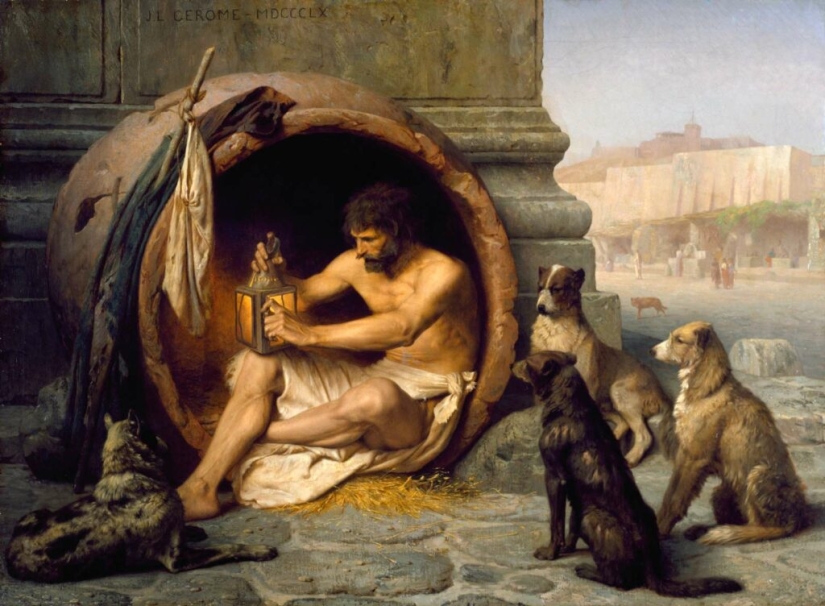Why did the ancient Greek philosopher Diogenes live in a barrel?
Diogenes of Sinope is one of the most famous ancient Greek philosophers. Few can explain the essence of his teaching, but almost everyone knows that the philosopher lived in a barrel. Was it really so? And if so, what made an elderly and wise man choose such an unusual dwelling?

In fact, Diogenes could not have lived in a barrel simply because the ancient Greeks did not make such containers in his time. Most likely, the philosopher's home was a pithos. We are talking about a large clay vessel that was used to store bulk products, mainly grain.

Archaeologists have found many pithoi during excavations, both damaged and preserved. These vessels resembled huge jugs, 1.5 to 2 meters high. They were completely buried in the ground, which helped maintain an ideal microclimate for storing grain. The temperature remained stable, without sharp fluctuations.

Most likely, Diogenes' pithos was not buried in the ground, but lay on its side. According to the information that has reached us, the philosopher's "house" was located in one of the squares of Corinth, where many people always gathered. This allowed Diogenes to easily communicate with the townspeople and give them advice - regardless of whether they asked for it or not.
The philosopher actively gave out recommendations on how to achieve spiritual freedom. At the same time, he was not shy about making fun of passers-by and even being cheeky. Nowadays, Diogenes would probably be called a prankster, a performance artist, or a troll, and perhaps even a punk. If he had had accounts on social networks, success as a blogger would have been guaranteed.

Diogenes often surprised people by talking to statues. He explained that this was how he trained himself to remain content, even if he was ignored. The philosopher often walked among the crowd during daylight hours with a lit lantern. Holding it up to the faces of passersby, he looked closely at them. This symbolic gesture signified the search for virtue and honesty, which, according to Diogenes, were always lacking in society. When he was asked what he would like to be if he could choose, the philosopher answered: "I want to be a man."

For his simple way of life and some importunity, he was nicknamed "living like a dog". In ancient Greek, this expression sounded like "kinikos" or "cynic", which explains a lot. Diogenes was also often called an "idiot", but this is not at all what you think. Although the chatty old man from the pithos irritated many, over time he became a landmark of Corinth, and later was known as a sage.

People began to come to Diogenes for advice and guidance even from afar. Gradually, he acquired followers. One day, Alexander the Great himself dropped in on the philosopher. Seeing how modestly the sage lived, the king asked how he could help him. To this, the impudent old man immediately replied: "Don't block my sun." Thus, Diogenes demonstrated his disdain for power and wealth, and also emphasized the value of self-sufficiency.
Of course, Diogenes did not choose pithos for life simply to play pranks on his fellow citizens. His deep convictions led him to this way of life. The philosopher sincerely believed that true happiness and virtue are in no way connected with external goods or comfort. By his existence in such conditions, he demonstrated asceticism and a complete rejection of the usual comforts and wealth.

Life in the pithos also vividly demonstrated that a wise and self-sufficient person needs very little to be happy. In this way, Diogenes proved that he does not depend on other people's opinions and generally accepted norms. Moreover, this way of life emphasized his contempt for generally accepted values and social standards.

It is safe to say that living in a pithos was not just a practical decision. It was a symbolic act that clearly reflected Diogenes' philosophical views and his challenge to social norms and values. But what do you think: was Diogenes a sage who challenged society, or an outrageous eccentric seeking attention? Share your opinion in the comments!
Recent articles

It's high time to admit that this whole hipster idea has gone too far. The concept has become so popular that even restaurants have ...

There is a perception that people only use 10% of their brain potential. But the heroes of our review, apparently, found a way to ...

New Year's is a time to surprise and delight loved ones not only with gifts but also with a unique presentation of the holiday ...